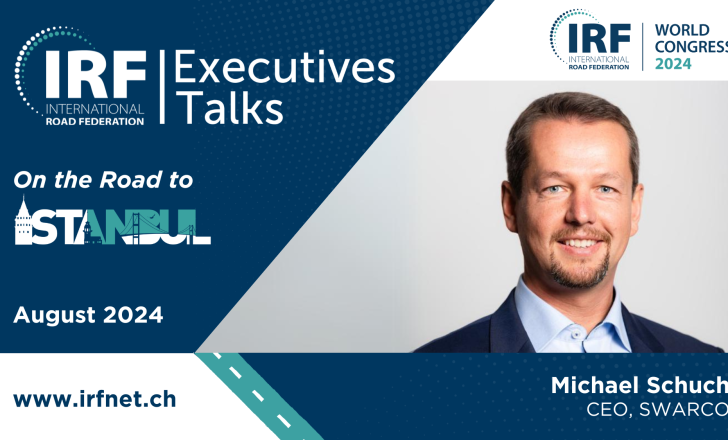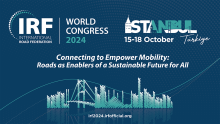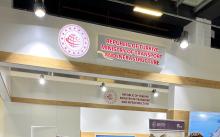
In the latest episode of the IRF Executives Talks hosted by the International Road Federation (IRF), Susanna Zammataro, IRF Director General, engages with Michael Schuch, chief executive of SWARCO. Part of the "On the Road to Istanbul" series leading up to the IRF World Congress 2024 scheduled for October 15-18, 2024, this episode looks into SWARCO’s pioneering work on intelligent transportation systems - ITS - and their view on the future of mobility.
IRF - With over five decades of industry experience, SWARCO stands as a global leader in road safety and intelligent traffic management. Michael, I’ve heard you speak at various forums about your commitment to putting people at the centre of your mission. What does that mean and how do you manage to do it in practice?
MS - As you rightly said, SWARCO is an expert in road safety and intelligent traffic management. We have a significant global presence through our products and solutions for road infrastructure, such as road markings, energy-saving LED signalling technology and software for comprehensive urban, interurban and tunnel mobility management.
For our customers - primarily public authorities, operators, system integrators and service companies - we strive to be the trusted choice for future-ready mobility solutions. This involves providing them with the right information and tools to help solve their daily challenges in urban and interurban traffic scenarios, not only for today but also for tomorrow. Alternatively, we offer full-service solutions to unburden them.
Ultimately, as you mentioned, our mission is about people, the citizen, the pedestrian, the cyclist, the driver, everyone. Our products, systems and solutions must ensure that daily travel becomes as safe and as convenient as possible, regardless of the chosen mode of transport.
Well-guided and smoother traffic flows also lead to reduced emissions from transport, which helps mitigate global warming and climate change. This is a fundamental element of our mission statement, or as we call it, our leading idea.
IRF - In the current context, where technology plays a crucial role in modern transportation, how is SWARCO leveraging technology to achieve these goals?
MS - Building on what I said earlier, it's not just about cutting-edge technology per se. It's about adding value for our customers and helping them solve their daily mobility challenges. This can involve several approaches. For example, we might adapt technology developed for other industries to our own sector by applying our domain expertise.
For instance, several years ago, we introduced energy-saving LED technology in traffic lights, significantly reducing both energy and maintenance costs for road authorities. Another example is the development of high-performance road marking systems that are easily readable by cameras and LiDAR technology, ensuring compatibility with modern automated or semi-automated vehicles.
We also explore more advanced technologies such as 5G or edge computing to innovate traffic control. SWARCO is fully committed to connected vehicle services and supports the rollout of connected, cooperative and automated mobility (CCAM). We are also exploring artificial intelligence in various components of our portfolio, with some live solutions already in place. Additionally, as a manufacturer of glass beads for road markings - which are quite energy-intensive - we continuously invest in new technologies to reduce our environmental footprint, focusing on more sustainable production processes.
IRF - Can you share any specific case studies or examples that illustrate how these solutions have been applied successfully?
MS - One notable example is a case study from Switzerland involving our high-performance beads, the SOLID PLUS product, used in zebra crossings. This application has greatly improved night time visibility. In Switzerland, where the markings of zebra-crossings are yellow, the combination of our SOLIDPLUS product with the material used for pedestrian crossings has significantly enhanced night time visibility. This improvement has reduced fatal accidents to almost zero, demonstrating how high-performance products can enhance safety and reduce fatalities.
IRF - Such applications could potentially save thousands of lives in other regions as well. To what extent can these technologies and methodologies be applied in other parts of the world?
MS - The SOLIDPLUS product is shipped globally, so its application is not limited to any specific region. We strive to be competitive on a global scale, considering factors like competition and regional pricing. We believe our technology, especially in production, can be competitive worldwide and we are committed to making it accessible wherever it can make a difference.
IRF - While we paint an optimistic picture with advanced technology and great services, we know that the reality often involves challenges. As a chief executive of a major international company, what are the main barriers you see to progress in the fields of ITS and road safety? How can we overcome these challenges?
MS - Your question touches on a significant concern. Our industry is heavily influenced by public procurement processes, tendering and public budgets. Several barriers to progress in intelligent transportation systems and road safety exist, some of which are due to the industry itself. These include a lack of cooperation, siloed approaches and proprietary solutions that hinder connectivity with existing systems.
Other challenges include infrastructure issues, such as compatibility with legacy systems that are more than 20 years old, funding shortfalls and regulatory inconsistencies. For instance, in Europe, there is no uniform standard for road markings, complicating the standardisation of safety measures. Additionally, there's often a lack of understanding of the benefits of high-performance products, which affects their adoption.
To tackle these challenges, there needs to be increased investment in road maintenance and improvements in road marking quality and visibility should be demanded in tender specifications. Harmonising regulations across regions can also help use economies of scale and accelerate preparations for automated vehicles. The time for pilot projects is over. We need wide-scale deployment of ITS solutions. This must be driven forward and it is essential for ensuring safer, more efficient roads.
IRF - These points you highlight are some of the critical issues that we will address at the IRF World Congress in Istanbul. What do you think makes gatherings like the IRF World Congress so vital for the industry? How do you see SWARCO contributing?
MS - Gatherings like the IRF World Congress are especially vital not only for this industry but in general. Because the IRF has an extremely strong global network that helps strengthening ties into existing markets. But more importantly, it also helps in opening new markets. And it is definitely a great platform for industry leaders to exchange ideas, showcase innovations and collaborate on delivering solutions to current challenges. It is a perfect event to discuss future trends and how can we jointly prepare and respond to these trends.
IRF - Is there anything special we can expect at your booth at the Congress? Any surprises or highlights you'd like to share?
MS - We will showcase an expanded version of our immersive “Go Green Virtual Reality Experience,” which demonstrates how modern ITS solutions can reduce air pollution, improve traffic flow and protect vulnerable road users. We will also highlight our high-performance glass beads, including the SOLIDPLUS product and airport markings designed to support inclusivity for disabled and visually impaired people.
IRF - Michael, if you could send one clear message to the ministers and influential stakeholders that will be attending the IRF World Congress, what would that be?
MS - My message would be, ensure that budgets for road infrastructure are protected. Mobility is about enabling individuals to move around effectively and efficiently and safely. And that plays a crucial role in enhancing quality of life, supporting economic opportunities and fostering social inclusion. But, do this while prioritising sustainability in tender processes. Do not select just the lowest bidder, but the one offering the best overall package with sustainable production, sustainable products and solutions. If we cultivate this now, it will grow into a sustainable legacy.
IRF - That's a message we fully support, as the IRF aligns with this vision. The Congress will be an opportunity to assess the progress of our industry and highlight the solutions we already have and how to best use them.
For info about the IRF World Congress, consult:
https://irf2024.irfofficial.org/
Watch the full interview with Michael Schuch on:










